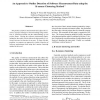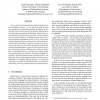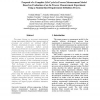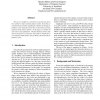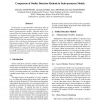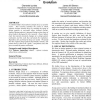123
click to vote
ESEM
2007
ACM
15 years 3 months ago
2007
ACM
An important number of studies have addressed the importance of models in software engineering, mainly in the design of robust software systems. Although models have been proven t...
123
click to vote
ESEM
2007
ACM
15 years 3 months ago
2007
ACM
Systematic reviews are one of the key building blocks of evidence-based software engineering. Current guidelines for such reviews are, for a large part, based on standard meta-ana...
116
click to vote
ESEM
2007
ACM
15 years 3 months ago
2007
ACM
The quality of software measurement data affects the accuracy of project manager’s decision making using estimation or prediction models and the understanding of real project st...
128
click to vote
ESEM
2007
ACM
15 years 3 months ago
2007
ACM
Can we predict locations of future refactoring based on the development history? In an empirical study of open source projects we found that attributes of software evolution data ...
147
click to vote
ESEM
2007
ACM
15 years 6 months ago
2007
ACM
This paper focuses on in-process measurements during requirements definition where measurements of processes and products are relatively difficult. However, development processes ...
102
click to vote
ESEM
2007
ACM
15 years 6 months ago
2007
ACM
The static modifier is a convenient way to make class members "global" in object-oriented software systems. Given this, we wondered if static members significantly contr...
109
click to vote
ESEM
2007
ACM
15 years 6 months ago
2007
ACM
In this paper, we experimentally evaluated the effect of outlier detection methods to improve the prediction performance of fault-proneness models. Detected outliers were removed ...
100
click to vote
ESEM
2007
ACM
15 years 6 months ago
2007
ACM
Comprehension errors in software design must be detected at their origin to avoid propagation into later portions of the software lifecycle and also the final system. This researc...
133
click to vote
ESEM
2007
ACM
15 years 6 months ago
2007
ACM
The goal of this paper is to improve the prediction performance of fault-prone module prediction models (fault-proneness models) by employing over/under sampling methods, which ar...
133
click to vote
ESEM
2007
ACM
15 years 6 months ago
2007
ACM
A common belief is that software designs decay as systems evolve. This research examines the extent to which software designs actually decay by studying the aging of design patter...

